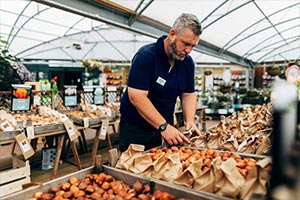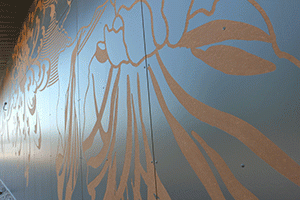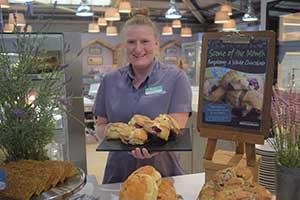National Resource Consortium (NRC) completed a waste management service project for Frosts Garden Centres. The bespoke project has increased recycling by over 300% and generated a reduction in costs of circa 20% - enabling the four centre group to achieve Zero Waste to Landfill Status.
Frosts Garden Centres is an award winning, family owned group of garden centres, which over the past 74 years has grown to be a highly respected brand with a loyal customer base, with sites at Woburn Sands, Brampton, Willington and Millets Farm in the South of England.
The four garden centres create a large amount of mixed waste, including wood waste, inert waste, green waste and plastic pots and trays. Warehousing at each site produces a range of materials and space at each site is varied.
When Frosts Garden Centres first approached NRC, the organisation recycled less than 20% of its waste stream. Presenting a complex waste management requirement, the Group looked to NRC to deliver a bespoke solution that improved efficiency and reduced costs. 
Following a deep analysis of their current arrangements using audit and invoice data to develop a range of scenarios to model potential improvements, NRC found the following:
- Inconsistent approach to separating waste across all centres
- Recyclable materials regularly ending up in the general waste stream
- Over charging
- Several different suppliers utilised across the group
- Lack of improvements or engagement from the existing supplier
- No opportunities to implement new systems to improve value and efficiency
NRC then designed and delivered a “blueprint’ solution across the Frosts Garden Centres Group, to reduce general waste, increase recycling and to introduce new equipment to improve operating efficiency and better materials value.
Each restaurant now has internal containers for preparation food waste and clean down food waste, enabling NRC to collect sorted food waste and to send it away for recycling and energy recovery at anaerobic digestion plants. Glass is segregated into allocated bins in the clean down area and sent for crushing and re-processing into new products.
Mixed recycling is taken to MRF’s (materials recovery facility) where the valuable material is extracted, bailed and sent for reprocessing.
General waste is sent to waste to energy plants and converted into electricity.
In the garden centres where the waste management requirements included: general waste, mixed recycling, wood waste, inert waste, metal waste, green waste, cardboard, pallets, film and plastic pots and trays. NRC recommended that all main sites had new equipment installed to reduce man hours for loading balers and producing mill sized bales for onward trading. The change has ensured that all sites now recycle card, film and pots and trays, receiving the best possible rebates from the market.
NRC and its Members found outlets for the pots and trays however they required them to be separated into the 2 different plastic grades. NRC worked with Frosts to define a system whereby the grades would be segregated at each site and the customers were offered a return service for their purchased pots and trays.
During the analysis process NRC discovered the following for the Groups main site:
It was being overcharged by £16,000 by its former supplier and were locked in for 9 months.
The customer requested a short term of additional collections over the busy Christmas period. The contractor required a new duty of care transfer to be signed which, unknown to the customer, combined the Duty of Care and Service Agreement in the same document. Locking in an unrequired additional collection for nearly a year.
The contractor collected wheeled bins and charged for all containers whether they were full or not. The contractor then calculated the weight of the containers they emptied. When those containers were above the maximum weight, they charged all the containers the overweight charge – effectively charging twice.
NRC took the back-up data and proved that the customer was due overweight credits of over £6,000. Unfortunately, the contractor refused to amend the services to the post-Christmas requirement, therefore charging the customer for servicing unused containers – at 100% profit.
NRC now manages all waste streams from all four sites, providing a single point of contact. NRC continues to monitor the performance of the sites and look for new waste streams to streamline and manage costs such as pallets and feminine hygiene, batteries and point of sale materials.
NRC reviewed the wheeled bin solution and recommended a compactor solution. This solution offers the flexibility the customer needs to deal with the peaks and troughs of waste output and also helped to save them over 50% across all their services.
General waste has been reduced and recycling now stands at 64% - an increase of 44%. 443 tonnes of materials recycled, including 6 tonnes of pots and trays. The residual waste all goes to be turned into fuel – meaning that the Frosts Group has achieved zero waste to landfill status.
NRC completes regular reviews and site visits – NRC now only looks for new ways to improve the system as well as ways in which to reinforce existing good behaviours or areas to improve.
NRC brings together leading independent waste operators from across the UK to deliver the most flexible, efficient and innovative waste solutions available. Its bespoke solutions help organisations achieve Zero Waste to Landfill status, meaning that at least 99% of generated waste is either reused, recycled, composted or used for waste to energy.
If you’re unsure what your current service is costing, NRC is currently offering a free waste audit for companies looking to highlight potential savings and save money during the Covid-19 pandemic. Email enquiries@uk-nrc.com or call 0845 299 6292 to discuss your potential savings.
www.uk-nrc.com



